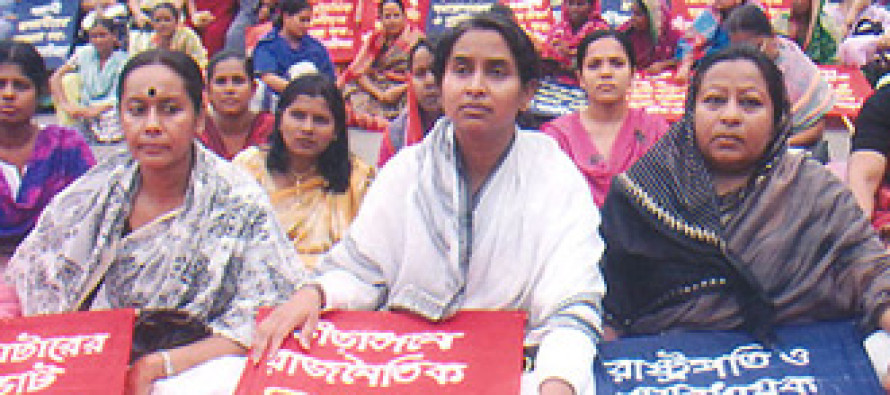Role of Foreign Ministry needs to be revamped

The appointment of Dr. Dipu Moni as Foreign Minister is a dramatic way of breaking tradition and Prime Minister Sheikh Hasina has demonstrated her desire to put gender equality in practice. In Asia, Japan, Philippines and Nepal had female Foreign Ministers. There are many instances in Africa, Latin America and Europe where females had held or are holding the position of Foreign Ministers.
We hope the appointment of the new Foreign Minister will re-vamp the pivotal role of the Ministry of Foreign Affairs in the government. In all countries, the Ministry or Department of Foreign /External Affairs has the primary and coordinating role in dealing with foreign countries.
Currently, the Ministry of Foreign Affairs (MFA) has no role in many of the vital areas in foreign relations. For example, in economic and foreign trade matters, or negotiations in Climate Change, MFA has a marginal or no role at all.
What is required is to strengthen the role of Ministry of Foreign Affairs in the context of political and economic environment of the 21st century in two fronts: (a) it must assert the coordinating policy role of all matters in relation to foreign countries and (b) it needs restructuring within it to be able to provide options to policy- makers.
Role of Foreign Ministry:
Bangladesh foreign policy stands primarily on two pillars: security and development. Foreign policy covers the entire gamut of foreign relations in such areas as, security, trade, manpower export, foreign direct investment, foreign aid, cultural matters, curbing terrorism, humanitarian, and environmental issues.
Foreign policy is no more confined to traditional diplomacy. Foreign policy includes economic and environmental diplomacy.
The myth that foreign policy does not affect ordinary people is wrong. Let me provide two examples.
Imagine two countries negotiating over fishing rights in the Bay of Bengal for their respective fishermen, or think about two countries sharing a common border and working out agreements on water-sharing, the migration of animals or trans-border drift of ash or chemical acid or pollution. Any agreed arrangements would directly affect ordinary people.
The price our people would sell or buy a commodity or the price common people pay for their food at a given time is affected by global trade policy. Global trade negotiation is an important component of foreign policy because the outcome would affect “bread and butter” issues of common people.
Let me give an example of the diminishing role of MFA. In recent years, Board of Investment (BOI) agreed with Taiwan to open its trade office in Dhaka. The Foreign Ministry was not consulted. When it created diplomatic faus- pas with People’s Republic of China, the MFA had to deal and sort out the mess.
Some go to the extreme and say if the arrangement of presenting credentials and farewell calls to the President by accredited Ambassadors to Bangladesh could be managed by Bangabhaban or Prime Minister’s Secretariat, no one would miss the Ministry of Foreign Affairs.
The diminishing role of the MFA Foreign Ministry is due to many factors and some of these are:
First, in the past, foreign policy did not get as much importance as it should have been because it does not bring votes. Second, the Prime Minister’s Secretariat had been so powerful that it either interfered with or rejected the policy recommendations of the Foreign Office on a given issue, to the detriment of national interest. Finally, each ministry, under the current rules of business of government, deals within its jurisdiction with a foreign country.
In my view, at least foreign trade and economic relations with foreign countries should come within ambit of the foreign ministry. In many countries, such as in Australia, the Department of Foreign Affairs, since 1988, is re-designated as the Department of Foreign Affairs & Trade.
Restructuring of the Foreign Ministry:
The Ministry of Foreign Affairs needs restructuring, given the challenges confronted by Bangladesh at the 21st century.
Two new divisions-namely Research and Evaluation as well as International Legal- with adequate manpower are to be created as soon as possible within the foreign ministry. The MFA without these two divisions is a boat without a rudder.
The Research and Evaluation Division will conduct an in-depth research of regional and global events and its anticipated impact on Bangladesh. It will provide the government short-term and long-term policy options within which Bangladesh may likely to operate in 5 or 10 or 15 years. The International Legal Division will examine the ramifications of an issue from international law point of view, for example, maritime boundary, and sharing of common river waters.
Bangladesh foreign policy operates in external environment, for instance, how Bangladesh should work to ensure greater regional and global security, how it should advance economic and trade interests, how it should address the adverse effects of climate change, and how it should respond to some of the issues of the new international agenda, food security, energy security, water security and lastly terrorism.
The new Foreign Minister may have a hard look at the functions of the foreign ministry if Bangladesh needs to successfully position itself and advance its national interests in the coming years.
By Barrister Harun ur Rashid
Former Bangladesh Ambassador to the UN, Geneva.


